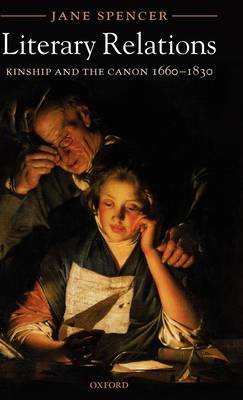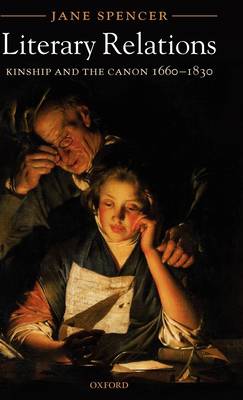
- Afhalen na 1 uur in een winkel met voorraad
- Gratis thuislevering in België vanaf € 30
- Ruim aanbod met 7 miljoen producten
- Afhalen na 1 uur in een winkel met voorraad
- Gratis thuislevering in België vanaf € 30
- Ruim aanbod met 7 miljoen producten
Zoeken
€ 117,95
+ 235 punten
Omschrijving
Literary Relations argues that kinship relations between writers, both literal and figurative, played a central part in the creation of a national tradition of English literature. Through studies of writing relationships, including those between William and Dorothy Wordsworth, Henry and Sarah Fielding, Frances and Richard Brinsley Sheridan, and Mary Wollstonecraft and Mary Shelley, it shows that kinship between writers played a significant role not just in individual lives but in the formation of generic traditions. As writers looked back to founding fathers, and hoped to have writing sons, the literary tradition was modeled on the patriarchal family, imagined in tropes of genealogy and inheritance. This marginalized but did not exclude women, and the study ranges from the work of Dryden, with its emphasis on literature as patrilineal inheritance, to the reception of Austen, which shows uneven but significant progress towards understanding the woman writer as an inheriting daughter and generative mother.
Specificaties
Betrokkenen
- Auteur(s):
- Uitgeverij:
Inhoud
- Aantal bladzijden:
- 280
- Taal:
- Engels
Eigenschappen
- Productcode (EAN):
- 9780199262960
- Verschijningsdatum:
- 29/12/2005
- Uitvoering:
- Hardcover
- Formaat:
- Genaaid
- Afmetingen:
- 155 mm x 223 mm
- Gewicht:
- 480 g

Alleen bij Standaard Boekhandel
+ 235 punten op je klantenkaart van Standaard Boekhandel
Beoordelingen
We publiceren alleen reviews die voldoen aan de voorwaarden voor reviews. Bekijk onze voorwaarden voor reviews.











